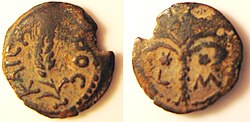
Marcus Ambivulus was the 2nd Roman Prefect of the province of Judea, comprising biblical Judea and Samaria. [1] [2]

Marcus Ambivulus was the 2nd Roman Prefect of the province of Judea, comprising biblical Judea and Samaria. [1] [2]
Originally a cavalry officer, he succeeded Coponius in 9 and ruled the area until 12, when he was succeeded by Annius Rufus. Josephus noted his tenure in the Antiquities of the Jews 18.31.